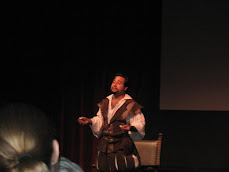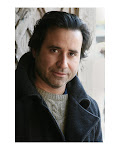CDOLEN@MIAMIHERALD.COM
A donut is no rational person’s idea of a light snack, but if you’re in the mood for something with both sweetness and substance, that donut can seem just about perfect.
Similarly, Tracy Letts’ most recent Broadway play, Superior Donuts, doesn’t have the heft or dramatic depth of his Pulitzer Prize-winning August: Osage County. But Superior Donuts, a conflict-laced comedy that opened at GableStage a day after August: Osage opened a few miles away at Actors’ Playhouse, has much to say about living in a diverse 21st Century America, surviving life’s traumas, and the war between resignation and hope. And at its heart, the play stands as a testament to the healing power of friendship.
Like his most honored play and the earlier Killer Joe, Bug and Man from Nebraska, Superior Donuts displays the talented Letts’ many gifts: snappy dialogue, an engaging plot, the way he laces even the funniest moments with darker undercurrents (and vice versa). This one, artfully and entertainingly staged by Joseph Adler, is set inside a tidily kept donut shop in Chicago’s Uptown neighborhood, a crime-ridden area that gentrification hasn’t transformed, the new Starbucks notwithstanding.
Presiding over his longtime family business is Arthur Prsybyszewski (Avi Hoffman), a depressed Vietnam-era draft dodger with both a mangy ponytail and a receding hairline. Sartorially, his taste runs to tie-dyed T-shirts that fail to conceal his 60-year-old’s paunch, and when business is slow — as it often is — he’s apt to lock the door and indulge in a toke or three.
His shop — a place so authentically rendered by designer Lyle Baskin that you want to claim a stool at the counter and order a donut — is a fleeting way station for everyone from beat cops Randy Osteen (Patti Gardner) and James Bailey (John Archie) to the neighborhood’s gentle alcoholic, Lady Boyle (Sally Bondi).
Max Tarasov (Chaz Mena), a flamboyant Russian immigrant who owns the DVD store next door, comes by often, fruitlessly trying to persuade Arthur to sell him the shop so that entrepreneurial Max can grow his version of the American dream. Later, bad guys Luther Flynn (Gordon McConnell) and Kevin Magee (Paul Homza) show up, as does Max’s hulking nephew Kiril (Alex Alvarez), all participating in a fight scene so well choreographed by Homza that it looks like Hoffman and McConnell are doing real damage to each other.
But the key “other” character in Superior Donuts is Franco Wicks (Marckenson Charles), a smart, energetic young black man Arthur hires to work in the shop. As rough as his life has been and is about to get, Franco is as powered by hope as Arthur is drained of it. The true sweetness of Superior Donuts flows from an evolving bond that betters both men.
The acting in Superior Donuts is, as is so often the case at GableStage, first-rate.
Hoffman has to cope with Arthur’s character-revealing monologues that, truth be told, could have been integrated as dialogue, and playing depression presents another challenge. But the actor crafts a character who is both an appealing mess and a stand-up guy. The funny, scene-stealing Mena makes you wish Letts would write a play about this wily Russian. In his short scenes, McConnell exudes smiling, exasperated menace.
Charles, a recent New World School of the Arts graduate, finds all the layers in the beautifully written Franco — charm, hustle, despair, joy, humor, the gift of inspiration. Watching him is exciting, both in the moment and because you realize you’re catching a talent at the beginning of what promises to be a brilliant career.























